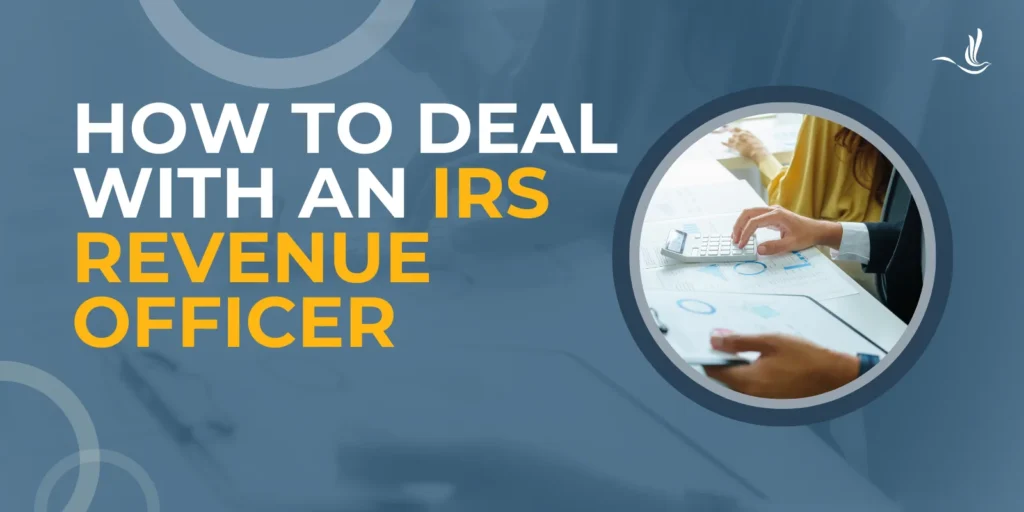
Encountering an IRS revenue officer can be a stressful experience, especially if you’re unfamiliar with their role and the potential implications of their visit. Understanding how to deal with a revenue officer effectively can make a significant difference in the outcome of your situation. Here’s a comprehensive guide to help you navigate this challenging scenario.
What is an IRS Revenue Officer?
An IRS revenue officer, or RO, is a field agent tasked with collecting unpaid taxes from individuals, businesses, and self-employed professionals. Unlike revenue agents, who conduct audits, revenue officers are primarily focused on securing payment for tax debts, often dealing with more severe cases where substantial amounts are owed or where there has been a history of non-compliance.
Revenue officers have the authority to take serious collection actions, including levying bank accounts, garnishing wages, and placing liens on property. Because of this, knowing how to interact with them is crucial.
Steps to Take When a Revenue Officer Contacts You
When dealing with an RO, it’s important to remember some key details. Here are some steps to take when a revenue officer contacts you.
Stay Calm and Professional
The first and most important step is to remain calm. Revenue officers are doing their job, and while their presence can be intimidating, maintaining a professional demeanor can prevent escalation and help you manage the situation more effectively.
Verify Their Identity
Always verify the identity of the revenue officer. They should provide you with an ID badge that includes their name, photo, and IRS identification number. You can also call the IRS at 1-800-829-1040 to confirm their legitimacy.
Understand the Scope of the Visit
Revenue officers may visit you at home or at your place of business. However, note that ROs are no longer allowed to conduct surprise visits. This decision came in 2023 to help taxpayers avoid scammers posing as the IRS to collect money. Remember, an RO’s goal is to collect unpaid taxes or ensure compliance with tax laws. During the initial visit, they will likely ask questions about your financial situation and may request documentation. Be clear about the purpose of their visit and ask for a detailed explanation if needed.
Do Not Provide Information Immediately
While you should cooperate with the revenue officer, it’s wise not to provide too much information during the initial meeting. Politely inform them that you need time to review their requests and consult with a tax professional. This can help prevent you from inadvertently sharing information that could complicate your case.
Consult a Tax Professional
One of the best steps you can take is to consult with a tax professional, such as an enrolled agent, tax attorney, or CPA, before providing detailed information to the revenue officer. A professional can help you understand your rights and obligations and assist in developing a strategy to resolve your tax issues.
Review Your Financial Situation
Before meeting with the revenue officer again, take the time to thoroughly review your financial situation. Gather all relevant documents, including tax returns, bank statements, and records of income and expenses. Understanding your financial position will help you negotiate effectively.
Negotiate Payment Arrangements
If you owe taxes, you may be able to negotiate a payment arrangement with the revenue officer. Options include installment agreements, offers in compromise, or temporarily delaying collection with CNC status if you’re facing financial hardship. Your tax professional can assist in these negotiations to ensure you get the best possible terms.
Keep Records of All Communications
Document all interactions with the revenue officer, including phone calls, meetings, and any correspondence. This record-keeping is crucial in case disputes arise or if you need to reference past agreements.
Understand Your Rights
You have rights when dealing with an IRS revenue officer. For example, you have the right to be treated fairly, to privacy, and to representation. The Taxpayer Bill of Rights outlines these protections, and being aware of them can empower you during the process.
Respond Promptly
Ignoring a revenue officer or failing to respond to their requests can lead to more severe collection actions. Even if you’re unable to pay the full amount owed, communicate with the officer and work towards a resolution.
Tax Help for Those Dealing with an RO
Dealing with an IRS revenue officer can be challenging, but with the right approach, you can navigate the process effectively. By staying calm, verifying their identity, consulting with a tax professional, and understanding your rights, you can work towards resolving your tax issues while minimizing stress and potential financial repercussions. Remember, proactive and informed actions are key to successfully managing your interactions with a revenue officer. Optima Tax Relief is the nation’s leading tax resolution firm with over a decade of experience helping taxpayers with tough tax situations.
If You Need Tax Help, Contact Us Today for a Free Consultation